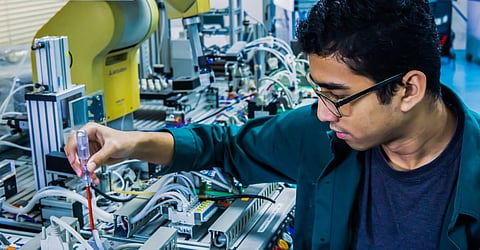
- NEWS
- the EDIT
- COMMENTARY
- BUSINESS
- LIFE
- SHOW
- ACTION
- GLOBAL GOALS
- SNAPS
- DYARYO TIRADA
- MORE

In the fast-paced world of technology, the electronics industry is caught in a perpetual conundrum. Despite the influx of fresh graduates, there remains a glaring disparity between their skills and the demands of semiconductor and electronics firms.
Thus, said Dr. Dan Lachica, president of Semiconductor and Electronics Industries in the Philippines Foundation Inc., or SEIPI, in Wednesday's interview on DAILY TRIBUNE's digital show Straight Talk.
"It is not a secret. Not just in the electronics industry but in other industries where college graduates nowadays don't have all the skills that companies need. They usually need to be trained in the skills that are essential for the success of the company or for them (graduates) to function well in the company," Lachica said.
He said that when he took over as SEIPI president 11 years ago, he and his group gave their inputs to the appropriate government agencies on how to avert or resolve the enduring problem.
"Since the clamor of industries is the need for more intensive skills for bachelor's degree graduates, SEIPI had a workforce to identify the subjects that needed to be strengthened and the technical skills that needed to be enhanced. We submitted the input to "this" government agency. It is 11 years now, and nothing has happened. That is why we still face that challenge today," he said.
SEIPI is the largest organization of foreign and Filipino electronics companies in the Philippines, aiming to make the country a globally competitive business environment for semiconductor and electronics technologies using Training, Research and Development/Roadmap, Advocacy, Information, Networking and Services.
Aside from semiconductor and electronics firms, Lachica said there are more than 40 50 colleges, universities, and training institutions included in the roster of their members being part of the supply chain and the supplier of the industry's talents.
Asked how many years fresh graduates take to be upskilled, Lachica said, "One to two years."
Bridging the gap
To contribute to the needed change, Lachica, who also sits as Chief of Party of Advanced Manufacturing Workforce Development Alliance or AMDev, said it sealed a memorandum of understanding with the United States Agency for International Development, the Unilab Foundation, and the Department of Trade and Industry to implement a five-year program designed to upskill and reskill the men and women in the manufacturing workforce, to make them Industry 4.0 ready.
AMDev, as an industry-led alliance, seeks to address the need to upskill and reskill the incoming and existing workforce, given the challenges hounding manufacturing in the Philippines.
The AMDEv program has a $5.2-million seed fund to implement its projects that are focused on formulating policy research and advocacy, the establishment of advanced manufacturing institutes, and the Advanced Manufacturing Skills Council.
"We have 12 partners in this endeavor, which range from model companies in pharmaceuticals electronics and two universities, among others. We pooled our resources together to look at the skills that require upskilling. Our target by the end of the five-year program is to produce 11,000 upskilled workers for advanced manufacturing," he said.
Global consultancy firm McKinsey defines the Fourth Industrial Revolution, or 4IR or Industry 4.0, as the next big phase in the digitization of the manufacturing sector, driven by disruptive trends, including the rise of data and connectivity, analytics, human-machine interaction, and improvements in robotics.
It is also often characterized by increasing automation and the employment of intelligent machines and smart factories.
"We will reach out to these manufacturing firms, share our findings and the courses that their workers can be trained in. The end goal is to improve the competitiveness of the company, the industry, and the country's overall competitiveness," Lachica said.
During the signing of the MoU, Trade Secretary Alfredo Pascual emphasized the agency's aim to strengthen collaboration and cooperation on Industrial Transformation and Workforce Development.
He said the alliance will contribute to the national discourse and policies on strategic human resources for the Philippines as it attains high-middle income status, shapes businesses to be more internationally competitive, and positions its youthful population to thrive in Industry 4.0.
It is said that the Philippine manufacturing workforce constitutes one of the largest segments of the country's workforce, which, for the second half of 2022, has provided an additional 174,000 new jobs for Filipinos, for a total of 4.45 million workers.
In the Philippine Development Plan 2023-2028, the government recognizes the manufacturing sector's low technological utilization. It points out that most companies and micro, small and medium enterprises are still transitioning from Industry 2.0 to Industry 3.0.
